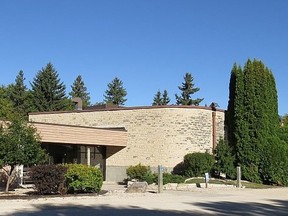
Article content
A Winnipeg church is taking a bold step towards reconciliation with Indigenous people by including reparations in their annual budget.
Advertisement 2
Story continues below
Article content
“The Christian church has emerged out of the settler-colonial mindset and taken property and land. It has grown society and grown intergenerational wealth off of the land that was taken,” Charleswood Mennonite Church co-pastor Jonathan Neufeld said.
Article content
“So part of that return work is to start to return some of those resources and that wealth back into Indigenous hands.”
According to Neufeld, an idea to put reparations for Indigenous people into the church’s budget was first brought to them by Adrian Jacobs, who is the senior leader for Indigenous Justice and Reconciliation in the Christian Reformed Church (CRC) in Canada.
“Through Adrian, there was an invitation for the church to a spiritual covenant, and part of his teachings was about the return of wealth, because wealth is what has been accrued on the backs of Indigenous peoples,” Neufeld said.
Article content
Advertisement 3
Story continues below
Article content

The church has decided it will put aside 1% of its annual budget every fiscal year, and that money will go to Indigenous-led and operated community organizations.
In January, the church put those reparations into its 2024 budget for the first time, which saw $3,800 split between the Clan Mothers Healing Village, and the Share the Gifts Reparations Fund.
The Clan Mother’s Healing Centre is a Winnipeg-based organization that provides support to women who have been victims of trauma, sexual violence, sexual exploitation, and trafficking, while the Share the Gifts Reparations Fund works to support Indigenous-led organizations under the belief that making financial reparations to Indigenous people is necessary throughout Canadian society.
Advertisement 4
Story continues below
Article content
It is important for Indigenous people to make decisions about where the money will be used and Neufeld said it is an Indigenous Solidarity Committee that ultimately will make those decisions every year when the budget is released.
“It’s part of that colonial mindset if we were to just sit here and decide where the money goes,” he said.
He added the church will have no role in how the money will be used.
“A good practice I believe is being more spacious in giving and letting someone else decide. We are not saying what you need to do with it,” Neufeld said. “We are saying ‘we see your work, and we hope this will benefit you.’
“There are no strings attached.”
The committee will also consider the need some not-for-profits and community groups have and how far the money could go to help them in their day-to-day operations.
Advertisement 5
Story continues below
Article content
“We don’t know anything about their budgets or anything like that, but we do know there are some groups that don’t always have a lot of money coming in.”
The Winnipeg-based Home Street Mennonite Church also recently decided that 1% of its annual budget will go to Indigenous-led organizations and Neufeld hopes more organizations, churches, businesses and governments consider taking similar steps as normalizing those types of moves and building them directly into operations could create a strong path towards reconciliation.
“There are opportunities everywhere if people become convinced that this is part of the repair work that we all need to participate in,” Neufeld said.
— Dave Baxter is a Local Journalism Initiative reporter who works out of the Winnipeg Sun. The Local Journalism Initiative is funded by the Government of Canada.
Article content
Comments